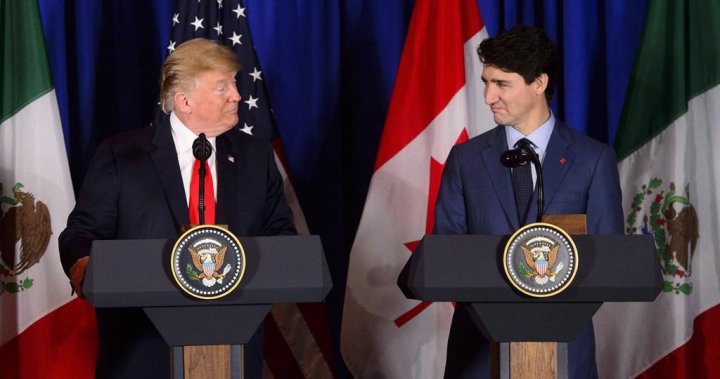Summarize this content to 2000 words in 6 paragraphs
U.S. President-Elect Donald Trump’s promise of massive new tariffs on Canadian products is “really concerning” and risks “serious consequences” to B.C.’s economy, according to a leading voice in the business community.
On Monday, Trump vowed to slap a 25 per cent tariff on all products coming from Canada and Mexico on his first day back in office.Trump said the tariffs would remain in place until the two countries “stop drugs, in particular fentanyl, and people from illegally crossing the borders.” “It might be bluster and it might be a negotiating tactic, but regardless it is a shot across the bow to Canada and it should be a wakeup call to Canada,” Greater Vancouver Board of Trade president Bridgitte Anderson told Global News.
Get breaking National news
For news impacting Canada and around the world, sign up for breaking news alerts delivered directly to you when they happen.
Anderson said leaders in British Columbia need to join with their counterparts in every province and the federal government on a “one Team Canada” approach to dealing with the U.S.On social media platform X, B.C. Premier David Eby said the proposed tariffs would “hurt Canadians and Americans alike.”https://x.com/Dave_Eby/status/1861223015847166341“Canadians must stand united. Ottawa must respond with strength. We’ll never stop fighting for British Columbian families,” Eby wrote.News of the tariff threat saw the Canadian dollar nearly a full cent in the hour after Trump’s announcement.
The United States is the largest market for B.C. goods, accounting for more than 54 per cent of exports, worth more than $30 billion, in 2023 according to statistics from the provincial government. “We are talking about wood exports, and I think we are all pretty familiar with the softwood lumber dispute and what kind of impact that has had in the forest sector … it would be even more negative. We are talking about all kinds of other exports that go to the United States,” Anderson said.“It could be job losses, higher costs, and comes at a time when our economic growth is stagnating.”Government data shows B.C. exported more than $5.7 billion in wood products to the U.S., more than $3.5 billion in agricultural products and over $8.2 billion in energy products including $4.8 billion in natural gas last year.Anderson said the U.S. does require a variety of products produced in B.C., and is also in need of water, something the province has traditionally had in abundance.“Here in British Columbia, we have a little negotiating power of our own, and we shouldn’t underestimate that, and we should be looking for ways to leverage that in the coming weeks and months,” she said.
More on Money
More videos
© 2024 Global News, a division of Corus Entertainment Inc.













